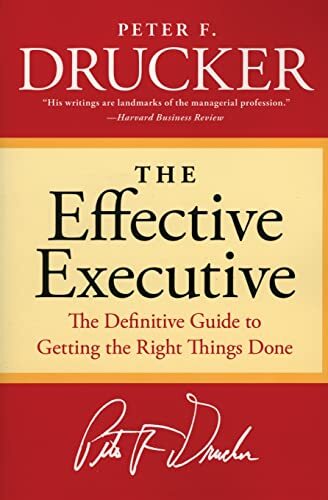
This isn’t a book on how to manage others, but how to manage yourself. Some parts feel a little dated (especially the language in the book and assumption all “executives” are male), some parts are obvious (though I learned many of them the hard way, so perhaps if I’d read this earlier in my career, it would’ve saved me some pain!), and some parts contain gems that are well worth reading.
A few of my favorite takeaways:
The executive is a hostage to their organization
The executive’s time belongs to everyone else: employees, customers, investors, etc. are all constantly asking for the executives time.
Time is almost always the most scarce resource
- You can spend money to buy products or hire people, but you can never buy more time.
- Once it’s gone, it can never be replaced.
- Therefore, time management is a critical skill for every executive.
Freeing up time
- For every activity on your schedule, first ask, “What would happen if this activity wasn’t done at all?”
- If the negative consequences are minor (or there are no negative consequences!) stop doing that activity.
- After that, the next question is, “What things are better done by someone else?”
- If someone else could do some part of your job better, delegate it to them.
- Focus your energy on what you do well.
The people you hire aren’t machines
This sounds obvious, but I often fall into the trap of expecting optimal performance in every aspect of work from everyone.
- Everyone has strengths and weaknesses.
- Everyone has good days and bad days.
- The amount of talent in the world is limited, and people talented in one area, usually aren’t talented in others.
- You’ll rarely find a “perfect” fit for the job (and if they are, the job will change and no longer be perfect).
The role of the executive is to build an organization that works well despite the fact that people aren’t perfect.
Hire for strengths
When hiring, hire people who have special strengths, rather than looking for people who have no weakness. The latter doesn’t exist. The former is essential to a successful organization.
In fact, you can define an effective organization as one which best:
- Makes the best use of people’s strengths.
- Helps mitigate their weaknesses.
Follow the leader
- The distance between the leader and their subordinates is a constant.
- If you raise the effectiveness of the leaders, the rest will follow, and rise with them.
Good decision-making
- Argue the opposite. When a lawyer is first starting their career, their first assignment is often to build the strongest possible case for the opposition. This teaches you to consider all sides of an argument.
- Good decisions require disagreement. If everyone in your org agrees, it’s either a very easy decision, or you’re missing critical information.
- Go all the way. If you’re going to decide to do something, do it all the way. Otherwise, it’s like a surgeon that operates and only removes half the appendix: you have all the pain and risk of infection, but don’t get the cure.
-
Elements of a good decision.
- What action to take
- Who should take it
- Who should know about it
- When is the deadline
- What alternatives you have in case things don’t work out
Send a follow-up email after every meeting
This email should outline:
- What decisions were made
- Who is responsible for them
- The deadline
If any of this information is missing, you didn’t do the meeting right!
Quotes
As always, I’ve saved a few of my favorite quotes:
Converting a decision into action requires answering several distinct questions: Who has to know of this decision? What action has to be taken? Who is to take it? And what does the action have to be so that the people who have to do it can do it? The first and the last of these are too often overlooked—with dire results.
If the executive lets the flow of events determine what he does, what he works on, and what he takes seriously, he will fritter himself away “operating.” He may be an excellent man. But he is certain to waste his knowledge and ability and to throw away what little effectiveness he might have achieved. What the executive needs are criteria which enable him to work on the truly important, that is, on contributions and results, even though the criteria are not found in the flow of events.
A decision without an alternative is a desperate gambler’s throw.
One cannot hire a hand—the whole man always comes with it.
If there is any one “secret” of effectiveness, it is concentration. Effective executives do first things first and they do one thing at a time.
